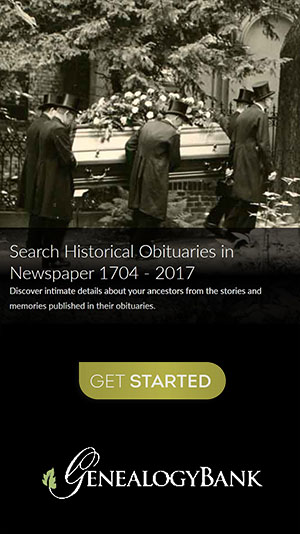Search Death Records (United States)
 U.S. Newspapers, 50 State Full Search (1690-present)
U.S. Newspapers, 50 State Full Search (1690-present) U.S. Obituary Database Search, (1696-present)
U.S. Obituary Database Search, (1696-present) U.S. Birth Announcements Database, (1700s-present)
U.S. Birth Announcements Database, (1700s-present)
 The
National Cemetery Administration Records Verification Project
The
National Cemetery Administration Records Verification Project
By Steve Paul Johnson, August 1, 2000
The National Cemetery
Administration (NCA), a division of the U.S. Department of Veterans
Affairs, has been undertaking an extensive project to verify the
burial records in their database. This is a painstaking process
of comparing the records in their database with original records
of interment.
In 1993, the NCA installed
a new computerized system of managing interment records. Up until then, records were recorded on
ROI forms (Record of Interment), which were later microfilmed. In order to perform a lookup, NCA staff
had to browse through microfilms.
Looking up records was particularly difficult, as all microfilmed
records were organized by year of interment, and then alphabetized
from there. Finding
a record meant first having to know the interment year, a piece
of information which many people did not have. The computer system
would allow the NCA to lookup records faster using less information.
All NCA cemeteries
began using the new system in 1993 for all new burials moving
forward. Adding the prior
records to the new system would prove to be a daunting task. To do this, the NCA hired a contractor
who digitized each microfilmed ROI form into an image. From there, optical character recognition
(OCR) was used to “read” imaged text and then transformed
into computer data. All
computer data was stored into a special database that the NCA
refers to as “the priors”.
The NCA estimates the
imaging and OCR process to have yielded an 80% accuracy rate.
Some ROI forms were handwritten and required manual transcription. On some forms, the OCR failed due to the
type being too faint to read, or the type not being centered in
the boxes. Additionally, the ROI forms changed shape
and style many times over the years causing even more transformation
problems. Some veterans'
remains were disinterred and moved to private cemeteries by their
families. Obviously,
the NCA could not remove these records from microfilm, yet they
were still imaged, read, and stored into the priors.
Before any of the data from the priors can be added to
the new system, each record must be manually verified as being
accurate and current. Hence, the verification project.
The NCA placed the
priors on a computer system that can be accessed by each of the
national cemeteries. Each cemetery has been asked to verify
these records. A
cemetery staff will get a record from the priors, and compare
it with a record that the cemetery itself had maintained locally.
In some cases, the staff will actually visit the gravesites
to verify that someone is there, and will even use information
from the tombstones. Some cemeteries have been very active
in verifying records, while others have not even started. The NCA currently allocates funds to the
cemeteries to pay for overtime and to hire outside workers. The NCA predicts that they will have to
hire a contractor to get the verification project completed in
a more timely fashion. About
10,000 to 15,000 records are verified each month, and about 30%
to 35% of the priors have been verified.
In some cases, the
cemeteries are finding that they have interment records that the
NCA does not have. Somehow, the original ROI form was misplaced,
or destroyed, and was never microfilmed. In this case, the cemeteries are adding
their own records to the new computer system.
Cemeteries outside
of the NCA have been making use of the new computer system as
well. The Army has begun using it for cemeteries
they administer, including Arlington National Cemetery.
Some state veterans’ cemeteries have started using
it also. Records
of all new burials are being added to those of the NCA, though
records previous to the new computer system have yet to be converted
over.
Some websites have
obtained copies of the verified and unverified records and are
publishing them online. Interment.net is currently incorporating
them, and has marked all unverified records with an asterisk (*). The NCA was asked if they would encourage
the public to come forward to provide verification. However, the NCA indicated that many of
these burials occurred over a hundred years ago, and in no way
could someone today vouch for such a burial, especially without
having copies of original records.
Other websites have
published these records also, but have failed to indicate which
records are unverified. As a result, some users have been shocked
with the results. In one case, the mother of a deceased child
visited one such website and found her child listed in the wrong
cemetery. She thought
that the NCA moved her child to a different cemetery without her
notification! The NCA had to explain that she found
an unverified record and that the website had failed to explain
this.
As to when the NCA
will complete the project, they could not estimate.
A decision still has to be made whether or not to hire
a contractor to expedite the verification.
Each cemetery has been allotted funds to conduct the verification,
but it is not known how they are using the money.
Once the verification is completed, the NCA plans to provide
a database search utility on its website.
- Steve Paul Johnson Steve is the editor of The Cemetery Column and Webmaster
of Cemetery Records Online.
Source: United States Department of Veterans Affairs, National Cemetery Administration
Search Cemetery Column
Submit a Transcription
Help genealogists worldwide research their family history!
- No cost to publish your transcription- You retain all rights to your work
- No one can edit, change, or delete your work

